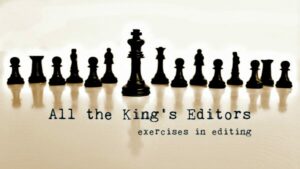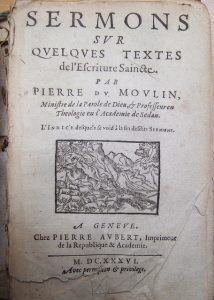Posts by Sarah Callender
This post is the next in the ‘All the King’s Editors’ series, the brainchild of WU contributor Dave King. In this series, WU contributors edit manuscript pages submitted by members of the larger WU community, and discuss the proposed changes.
This is intended to be an educational format, and we hope this exercise will generate useful comments about the proposed changes–why the editorial suggestions do or don’t work. Each participating editor will approach a submission in a unique way, and speaks only for him or herself.
If you’re interested in submitting a sample for consideration, click HERE for instructions.
* * *
Hi friends. First of all, I’d like to applaud the brave submitters. It takes courage to submit work for feedback, especially in this public forum.
You’ll see what I have added or moved (in red); the strikethrough shows what I have deleted. While it looks like I deleted and added significant sections, it’s really that I moved sentences around. This writing is really tight as is.
The Submission:
Maggie sets her wine glass down and sweeps a handful of rose petals off the table and into her palm. The rose bush, which blankets the pergola, has been dropping petals all evening. They litter the white embroidered tablecloth, and form drifts around the half-dozen empty wine bottles. When they fall into the flickering votive candles, they sizzle and send plumes of black, acrid smoke into the dark night.
Maggie holds her palmfull of petals toward her sister and raises her eyebrows. “How about a crown?”
When Justine doesn’t protest, Maggie yanking her sister’s chin face toward her begins arranging She arranges the pale pink petals in a circle on her sister’s Justine’s crown of dark hair.
“Just like when we were kids,” Justine says. “You were always the crown-maker.” The rose bush, which blankets the pergola, has been dropping petals on them all evening. They litter the white embroidered tablecloth, and form drifts around the half-dozen empty wine bottles. When they fall into the flickering votive candles they sizzle and send a plume of black, acrid smoke into the dark night.
Maggie smiles, focusing on the task. “Right. Because you needed something pretty.”
When she and Justine were younger, people used to say they could be twins: the same hair, the same high cheekbones, and the same long, thin nose. But a babysitter once told them that while Justine was pretty, Maggie was beautiful, a statement Maggie took as a universal truth. She assumed Justine took it that way as well.
Note: I’m curious about Justine’s facial expressions, posture, etc. Can you give the reader some idea how Justine, a grown woman, feels about having her sister arrange a petal crown on her head?
I’d also like to see, right away, who else is at this table; I assumed it was just the two sisters. Could Lizzy and Sonia say or do something during the crown-making to reveal their presence?
I love the imagery. The fragrant, pink petals that–surprise–also create black smoke plumes? Perfect. If we scratch the surface of this family, all is not so rosy!
Read MoreMy son, a fourteen-year-old high school freshman (with a hyperactive amygdala and a sleepy frontal lobe) plays the viola. My daughter, a thirteen-year-old seventh grader (whose frontal lobe is only slightly less sleepy) plays the violin. The important information in those sentences is not that my children’s brains are akin to those of prehistoric reptiles, but that they play string instruments.
That said, may I tell you what the reptiles’ bedrooms look like? They are icky. Swamp-like. My son’s is choked with stinky laundry. Old math tests and candy wrappers from candy I did not give him. My daughter’s is a bog of art supplies, Tupperwares of slime and sequins, knickknacks up the wazoo. I keep their bedroom doors closed.
The important information in the previous paragraph is that I keep my reptiles’ bedroom doors closed. And, yes, that my reptiles play string instruments.
In Seattle, there are several amazing makers of violins and violas, and when my son and daughter need a bigger instrument, a tune up, a bow re-hair, we go to James Martin Violins*. But as many times as I have been there, I can never recall where on the block his shop is located. There’s no big sign advertising his name and his craft, no storefront with a display of string instruments. There’s only a nearly-invisible recessed door and a small brass plaque that reads James Martin Violins. I always walk right past the door. Always. And I always worry I am on the wrong block.
Read MoreLast weekend, my husband and I took a quick jaunt to Chicago, the city where we met, dated and became betrothed. Our trip to the Windy City was twofold—an anniversary getaway (romantic!) and a way for my husband to get enough miles on Alaska Airlines to maintain his MVP status (not romantic!).
I had never once gone to improv at Second City, so we bought tickets, took our seats in the old people’s section, and laughed and marveled at the talent and quick-wittedness of the comedic actors. At least we marveled at four of the five comedic actors. While the fifth seemed to suspect that she was bombing, she didn’t embrace the bombing. As a result, highly sensitive and unnecessarily empathetic me felt like I was bombing right alongside her. It was like schadenfreude, only different.
During the show, when I wasn’t blown being away by the courage of the actors, or laughing at their wit, or doing empathetic schadenfreude or calculating that at least we were the youngest members of the old person section, I wondered whether the elements that make improv work (or flop) are the same as those that make fiction sing (or flounder). Here’s what I came up with. (Here’s up with what I came?)
Read MoreWho you see depends on your POV!
Each Wednesday at 3:00 I drive a loved one to see his therapist.* During the 45-minute appointment, I sit in the waiting area and afterward, depending on the season, I drive this loved one to swim practice or soccer practice or to the grocery store to pick up a snickerdoodle or a pizza bagel for a snack.
After each session I do not ask the following questions:
1. So … what’d you guys talk about?
2. So … was the appointment helpful and if so, why?
3. So … does your therapist think I am, generally, a good mom?
The question I do ask: “So … Pizza bagel or snickerdoodle?”
But Holy Freud, Batman! I am DYING to know what has been said–about ME–in those 45 minutes. I want to hear how my loved one interprets my actions, my words, my blunders, and my love for him. I want to know how he misunderstands me and with whom the therapist sides. I want to know how I am being portrayed. How closely my truth aligns with my loved one’s truth. The ways that my loved one’s perspective differs from mine. Whether this paid professional thinks I’m a train-wreck.
Why doesn’t the therapist ask to hear my side of the story?
We all tend to believe that our point of view is the truest truth there is. But if I’m going to act like a grownup, I have to let go of the rightness of my version of truth and make room for the co-existing truth of this loved one. His point of view is just as valid as mine. Just as true too.
Have you seen Akira Kurosawa’s 1951 film, Rashomon? If not, check it out. If you haven’t seen it recently, rewatch it from the point of view of a writer studying POV in fiction. It offers a fascinating example of the relationship between POV, perspective, motive and truth.
Here’s the nutshell: In Rashomon, the story of a rape and a murder are recounted by four witnesses. As you might imagine, the four accounts vary wildly: Was the sex consensual or was it rape? Was the man murdered or did he die by suicide? And for crying out loud, whodunit? Whose truth is true?
While some viewers might feel frustrated by the ambiguity and truthiness of each character’s version of the crime, we writers likely find the film’s ambiguity delicious. The variety in points of view sparks questions about each character’s values, biases, secrets, motives and desires. As we see how one character interpret words, actions and events so differently from another character, we are reminded that truth truly is relative.
Story opens our eyes to the possibility that other valid points of view exist. Story reminds us to recognize that others’ truths are as true to them as our own truths are to us. These days, everyone’s so determined to be so dang right all the time. I wonder if the United States would feel more united if everyone were willing to read stories with a simple goal: to see and experience another […]
Read MoreAccording to Discovery.com, the female frilled shark carries her babies for up to 3.5 years before giving birth. As someone who was throw-uppy for the duration of my pregnancies, I think the frilled shark’s lengthy gestation sounds miserable.
On the other hand, as someone who is gestating a novel (and has been for the past 4.5 years), I find the details of the frilled shark’s gestation rather comforting. Since I am only 25% through a draft of my manuscript (and already a full year slower than the frilled shark), I am hopeful that, once complete, it will be even more appealing than a frilled shark baby. Frilled sharks of any age make Hammerheads look like pageant queens. They have three hundred teeth. Arranged in 25 rows. I won’t post a picture of a frilled shark because you might feel scared. (But here’s a link.)
I feel sheepish that I write at the speed of sloth, but what’s even more humbling is this WIP’s metamorphosis over the last 4.5 years. When I started, this book was about “the friendship between an American boy with albinism and an African girl with albinism.”
You probably noticed there’s no plot there. There’s no hook or even the whiff of a conflict. But I, green and ridiculously optimistic that a conflict would emerge, plowed ahead. And then I came to a dead end because plotless stories always come to dead ends. I learned this from WU’ers James Scott Bell, David Corbett, Lisa Cron, and Donald Maass.
So back to the drawing board went I, and another draft emerged, one that involved albinism and Antarctica. Dead end. After that, another draft that focused on war and Antarctica. Then a shut-in wife who never left the house and her husband, a serial soldier, who liked war more than he liked his family. And that evolved, somehow, into a story about two kids, Caesar and Sylvia, and it took place in Antarctica. It was cleverly titled, CAESAR AND SYLVIA IN ANTARCTICA.
(I am literally cringing as I share these plotless novel ideas with you.)
Read MoreHooray! My kids (age 12 and 14) went back to school last week.
Boo! I have a puppy who’s on day four of diarrhea and mild depression. (The puppy has the intestinal distress. I have the depression.)
As someone with bipolar 2, I tend to spend most of my unstable-mood time in depression rather than mania. And as my husband recently reminded me, I tend to take a dip each September. I hate that about myself. By now I really should have control over my moods … you know, just like someone with poor eyesight should have control over how light rays bend as they pass through the cornea. Ha.
Beyond the current mood slide, the past ten months have offered other distractions that have pulled me from noveling: two nasty surgeries (foot and sinus), freelance projects (huge in time, dinky in money), adventures in caring for aging parents, roller coaster rides with a particular teenager whom I love very much. And of course, summer: 2.5 months during which my kids became obsessed with magic tricks. I watched a lot of magic tricks over the summer. Maybe about 450,000 magic tricks.
I wish my kids could teach me to wave a magic wand and make depression disappear. Escort it into a box then saw the box in half. Turn it into a beautiful white dove. I wish my kids could magically pump the world with a little helium so it didn’t feel so dang heavy.
I am getting to my point.
You, too, might have fragile brain wiring. You might have had recent health adventures, family obligations, loads of work. You might be an over-empathizer who feels weighty sorrow on behalf of those facing hurricanes, racism, famine, acts of terrorism and 8.1 quakes. Your heart might be cracking on behalf of refugees, immigrants, and the general state of the not-very-United States.
Aren’t I cheery today!
My point (in the form of a question) is this: When we are in one of these unwelcome periods where the world weighs too much, when we feel flat and sad and weary, when we are distracted by life’s life-ishness, how do we keep writing? Or in my case, how do I start writing again?
I might have an idea.
Read MoreLast week my husband and I forked over the $20.50 (per ticket!) to see the IMAX version of Dunkirk, a gorgeous film that left me weary and numb and in awe of the strength and courage of my fellow human beings. It’s really astounding, such courage. Me? I’m scared of head lice, sidewalk grates and Halloween. I’d be a ridiculous soldier.
But driving home after the film, I realized my husband and I were talking about the characters, not by name but by descriptor: The old civilian man, the pilot, the shell shocked guy, the young English soldier, the young English soldier’s French friend. Kenneth Branagh.
“Hey,” I said to my husband. “What was the name of the main character? The young English soldier?”
My husband couldn’t answer. Neither could I.
“How about the pilot?” I said. “Did we know his name? Or the old civilian man? Did we know any of these characters’ names?”
He and I realized we could recall the name of only one character: George, a teenage civilian hoping to one day get his picture in the paper to please his father.
We stopped at a red light. “Actually,” I continued, “a lot of times I couldn’t even tell which character was who.” Then it hit me. “Oh my gosh! We knew nothing about those characters. No back story at all.” I paused, reviewing the details of the film to see if that was true. “No names, indistinguishable faces, identical uniforms, no back story … that equals no character development! How, without the help of fleshy, flawed characters, did that film impact me?”
My husband was quiet for a few beats. He’s always quiet for a few beats before he says smart and insightful stuff.
Read MoreHere’s a truth: I have earned precisely zero dollars for my fiction. Two decades of studying the craft, thousands of practice pages, tens of thousands of hours. But you know what? That’s OK because I don’t write for money. I write for me, not for anyone else. My stories don’t have to be commercially valuable in order for me to know they matter. Writing is a labor of love. I write because I would shrivel into a sour crab-apple of a raisin-lady if I didn’t have at least a sliver of time to write each week. I wouldn’t love writing more if I made money doing it. Artists are supposed to starve. We are supposed to suffer for our craft. Therefore, I’m OK if I never earn a dollar on my fiction.
Here’s another truth: I am absolutely not OK if I never earn a dollar on my fiction. I long for a hefty book deal. I want my time (and my husband’s support and patience) to be rewarded financially. When supportive friends ask, “How’s the writing?” I want to say something other than, “Well, I’m still plugging along. I still love my agent. Still working on book #3.” I want to write a manuscript that creates a bidding war. I want to financially contribute to my family. I don’t write just for myself. I write because I want other people to read (and buy) my books. I want to earn so much money on my books that my husband can retire and we can afford out-of-state college tuition for the kids and fix the siding on the south wall of our house.
Man, does that last statement feel crass. Crass and stupid. Writers should never be writers if they are writing for the money.
On the other hand, I am a product of a society that uses money to assign value to things. I believe my work has value. I believe my time has value. Shouldn’t I be compensated? Isn’t it OK to want money?
Clearly, I have some inner turmoil when it comes to money and art.
Read MoreI just finished listening to a podcast called S-town. It’s a tough and amazing story, though not for the faint of heart, cursing-wise and other-stuff-wise, but I fell in love with the main character, John B, by the end of the first episode.
(The skinny: A resident of S-town, Alabama, John B. emails the folks at National Public Radio’s This American Life, imploring them, somewhat relentlessly, to come down from New York and help uncover a covered-up murder. The nice folks at TAL do indeed head south, and the S-town podcast is born.)
After listening to the first episode, I texted my husband the link to the podcast with this message: You have GOT to listen to this. The main character is fantastic. You will love it.
My husband listened to the first episode. He liked it. He didn’t love it.
I couldn’t figure out why this man I loved so much (my husband) didn’t love this other man I loved so much (John B.) until I started listening to the second episode. And then it hit me: John B. and I were cut from similar cloths. He felt familiar.
While he is not someone with whom I’d want more than a podcast relationship, I felt a kinship with this Alabaman. Why? Because John B. obsesses. He cannot stop thinking about things like climate change, making a hedge maze, caring for stray dogs, climate change, and don’t forget climate change. He says he hates where he lives. He cannot abide the racism or the lack of quality education. He cannot believe people don’t care that polar ice caps are melting. He counts minutes and repairs old clocks and determines the meaning of a life well lived, and he is terrified that people are not paying attention to, for example, climate change. I think it was the second episode where he says something to the effect of, IS ANYONE PAYING ATTENTION?
I wonder that very question a hundred times a day.
A few weeks ago, we had a sunny, perfect Seattle-weather day. My husband and I sat outside, watching our puppy go nuts over a squirrel that was fifty feet up the huge pine tree in our tiny yard. Up on his hind legs, the pup was barking and chewing at the tree bark as if he were part beaver. It’s not healthy, his squirrel obsession. But it feels familiar.
Before the squirrel arrived, my normal husband and not-so-normal I were talking about Ariana Grande concerts, refugees, politicians, the deaths by suicide of Chris Cornell, an 8th grader in our community and a 7th grader in the next town over. I talk about these topics quite a lot, mostly because I want to understand how certain things happen, and why they happen, and is there anything I can do to stop them from happening? And again with my threadbare question, Is anyone paying attention?
I took a breath. I asked my normal husband, “Does it bother you that I can get a little … obsessed?”
Read MoreThis past weekend, I was lucky enough to find myself sitting in front of a Van Gogh at the Metropolitan Museum of Art. While sitting, I was also talking on the phone to a certain teenager whom I happened to birth in 2003. This teenager was 3,000 miles away from me and the Van Gogh, and he had called to ask me whether he should retake the Bio test on which he had earned a 10/25. He wasn’t sure if he should.
“I’m not sure if I should,” he said.
I looked at Van Gogh’s self portrait. He didn’t look well. Probably teenagers had impacted his mental health. I rubbed my ear and gave my inner Helicopter Mother a mental shove to make room for my inner Mother of Perpetual Pseudo-Patience.
The latter gently said, Do NOT tell him what to do. If you are always telling him what to, he will never learn how and what to do without you telling him what and how to do it. And then you’ll wake up one day and you will realize he is forty-eight years old and still lives with you and still expects that you will make him hash browns and a banana smoothie for breakfast.
“OK,” I said into the phone, “what are the pros and cons of retaking the test?”
Helicopter Mother rolled her eyes and snorted.
“I mean, it’s nice,” I continued, “that Ms. C. is letting you do a retake. Tell me what you’re thinking about your options.”
“I’m not sure what I’m thinking,” he said.
I tugged on my ear some more. I needed a Monet or a Manet or something more soothing than Vincent Van Gogh’s self portrait staring at me. How about one of those Degas dancers? A flock of those Degas ballet ladies would help neutralize the Wild West boy brain on the end of the phone line. Maybe.
Read MoreThis past February and March were Seattle’s mossiest, moldiest and mushroomiest Februarys and Marches in 120 years. In other words, it was really rainy. Usually the gray makes me cozy and able to focus on work, but this year, it has made me angry and frizzy. Crabby too. So when a few weeks back I sat down to write at a coffee shop and I specifically chose to sit next to a guy who was clearly working on his computer and would therefore not be chatting with anyone, and but so then a female friend sat down and they proceeded to talk and talk and talk, breaking talking records for the months of February and March, I got irritated.
The woman (tall, thin in that pinched way, sensible jeans, no makeup, and mid-forties, self-absorbed and epically dull) was the problem. She yakked boastfully about her “mindfulness around food and eating.” She yakked whinily about sitting in the middle seat of the center aisle of her flight home from India. (To summarize: the middle seat of the center aisle isn’t great. Who knew?) She yakked nasally about the henna paintings on her arm. About how she had missed fresh veggies whilst in India. How, in India, she was the only person in the whole group who didn’t fall off her paddle board.
In sunnier seasons, I love to eavesdrop, to play detective and figure out the players and their dynamics and the subtexts of their conversations. I hunger for narrative closeness. Not with this lady. I wanted to be nowhere near her narrative.
We writers often talk about point of view, focusing only on first person or third, or limited third or omniscient second, or shifting close third, or a grande extra hot split-shot caramel macchiato.
But in addition to first vs. third vs. omniscient, we also need to consider narrative distance—a tool writers use to manipulate the distance between the reader and a narrator.
Read MoreI don’t know how many Christians live in Seattle, but most days it feels like there are roughly fourteen of us. On Christmas and Easter, that number can surge to maybe thirty-seven … thirty-eight max.
I’m not a very impressive Christian. I find some people hard to love. I drop f-bombs under duress. I can beat anyone, with the exception of my friend, Robin, in a Mike’s Hard Lemonade chugging contest. Once, when my daughter was two years old and she wouldn’t get in the car and we were late for summer camp at our church (where I was teaching her class), I yelled, “Get in the f-word-ing car NOW!” #ShiningJesus’Love
My faith is the most important part of who I am, but that doesn’t mean it’s always so strong. Because many close friends and relatives don’t share my faith, I frequently find myself questioning and wondering. Doubting too.
There’s quite a lot to question and doubt. Jonah inside the big fish. The virgin birth. The empty tomb. The Garden of Eden. If the Bible didn’t contain so many outrageous stories (and if Christians loved more often than they judged), church pews everywhere might be a little fuller.
But faith requires a big leap. Faith wouldn’t be faith if there were proof.
Read MoreLately I’ve been thinking a lot about hope. And I’ve been thinking a lot about despair. Generally speaking, I try to maintain a posture of hope because I hear it’s good for my abs. Plus, I find I feel better when I am splashing around in hope rather than in despair.
But then I see and hear what others are doing around me, how they are talking, the extent to which they are fearing, and I wonder whether spending time in hope is naive and complacent. Am I an ostrich, my head jammed in the sand? Can someone living in Hope, USA simultaneously fight for social justice? Are conspiracy theorists wiser than I? Is core strength really all that important? And the big one: When the USA is not at all U, am I–as a writer and as a human–meant to plant myself in hope or in despair?
Worried that I have no answers to these questions, I gather my towel, my Otter Pops and my sunblock and meander over to the pit of despair. Sticking my toe in, there’s that immediate, delicious rush of We’re going to die! The world’s going to end! We must tell the others! Don’t forget to put the can opener in the emergency rations bin!
And it all feels so heart-racing and TRUE.
Read MoreMy first year teaching high school English, I had a student in my sophomore honors class whom I’ll call Alex. Alex was the first kid I caught plagiarizing. The assignment was an RFTS–Reading from the Silence–an opportunity for kids to write an original anything: poetry, fiction, personal essays, song lyrics. I’d always write an RFTS too, usually a not-inappropriately-personal essay, some very terrible bits of fiction, an op-ed piece about the Oklahoma City bombing, a not-too-revealing poem inspired by the heartache of being dumped two times by one beau.
Each Friday, part of the class was set aside to share our RFTS writing. We’d turn the lights low and sit in silence until the first brave soul started reading his or her piece. Reading from the silence.
That was in Skokie, Illinois in the mid-nineties. At twenty-two years old, I was as green as could be. Even today I want to write apology letters to my guinea pig students in those early years of teaching.
But RFTS was, by most accounts, a big hit. Some liked the freedom of writing whatever moved them. Others liked to space out in a dimly-lit classroom. Still others liked that it was easy points; if the student wrote something original and thoughtful and legible, he earned 10/10. Some kids wrote a fifteen-page RFTS; some kids wrote a single, angst-filled sonnet about questioning authority or defying the school dress code. Some kids shared their work every week; some kids never shared.
My student, Alex, was not one who often shared during RFTS. He wrote analytical essays that felt like algebraic equations. He didn’t seem to love literature. He was a nice kid, a little nervous, but also kind, conscientious and intelligent. On his report card, I might have said the following: Alex completes daily assignments in a timely manner. Alex is an active participant in small and/or large group discussion. Alex communicates effectively. (1)
Alex also turned in an “original” RFTS that was the word-for-word lyrics of a James Taylor song. When I confronted him, he claimed innocence. Several times. Ah, and when the student doth protest too much, methinks there’s a confession to be made. (2)
Read More





















